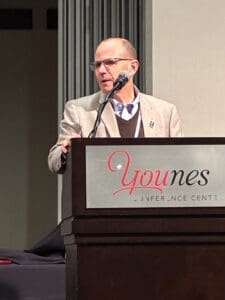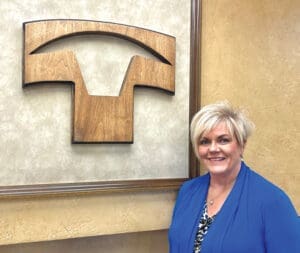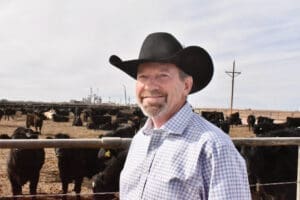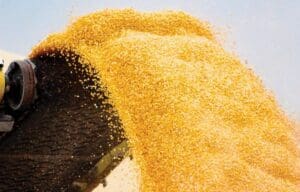If You Have Them, So Why Not Share Them
By Larry Stalcup, Contributing Editor
#CattleTales
You’ve likely seen that hashtag in social media or print. It’s everywhere. Immersed in all forms of social media, CattleTales enables anyone and everyone in the beef and dairy industry to share their personal stories about their farms, ranches, feedyards and dairies.
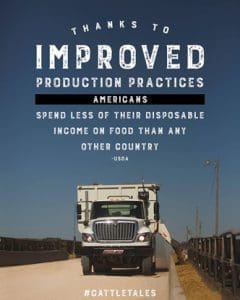
#CattleTales was officially kicked off at this year’s NCBA Trade Show in Phoenix. It stood out with unconventional, eye-catching splashes of bright turquoise, orange, purple and other colors.
“It’s a communications campaign with the goal of increasing the awareness of how beef and dairy go from farm to fridge and how their byproducts impact daily lives,” says Shannon Wilson, a long-time, all-things-beef advocate and independent consultant for Micro Technologies and Elanco Animal Health.
“Our CattleTales mission is to improve perceptions of beef and dairy production with trust, transparency, open conversations and answering questions. The public is curious about agriculture. CattleTales enables you to share your story with someone. If you don’t tell your story, someone else will tell it for you.”
NCBA and the American National CattleWomen have been pushing social media for several years. Their goal is to reach those who depend on Facebook, YouTube, Twitter or Instagram to determine what’s for dinner. Those numbers are astounding. And of course, a majority of those consumers are Millennials.
Wilson notes that, according to a 2017 Pew Research report, 80 percent of consumers consult their phones about purchases before buying, 40 percent of consumers learn about food online, 59 percent of Millennials are price conscious, 46 percent are brand loyal and 22 percent of moms are Millennials.
Unfortunately, there are some Millennial numbers that need to be changed – 48 percent of Millennials believe genetically modified foods are worse for health, 61 percent believe organic is better for health, 12 percent try vegan, vegetarian diets each year. And worse yet, 75 percent of Millennials consider food grown on large-scale farms or feedlots to be a health risk of contamination by bacteria or germs. Ouch!
Wilson and her corral of CattleTales are determined to change those perceptions. She has been deep into the fed-cattle industry since she attended Texas A&M University. She grew up in Waller, Texas, between Houston and College Station and got hooked on showing animals through 4-H. She first attended Casper (Wyo.) College, then transferred to A&M.
That’s when she began working with the late John McNeill, an animal science practitioner and visionary who opened many eyes to the value-added-calf concept of providing detailed animal health records for calves. “I was a student worker and got to work with John McNeill in the Ranch to Rail program,” Wilson remembers. “I had the privilege to work with all of the university beef cattle specialists and helped coordinate the Beef Cattle Short Course.
“While livestock judging for A&M, I won a few awards at Louisville (North American International Livestock Exposition),” she says. “Before I got home, Dr. Dennis White of Elanco called Dr. McNeill and asked about me. Within a few days, I flew to Indianapolis for an interview with Elanco.”
She hired on in 1998 and worked with producers and feeders in the Dakotas and Iowa before moving to the Texas Panhandle to work with large feeding organizations and distribution channels for Elanco. She met Heath Wilson, who at the time was checking livers at the packing plants. They now are married with three girls: Alex, 13, Riley, 10, and Reese, 8. In 2015, Wilson decided to step back from the travel demands of Elanco and start her own business, Know Forte, LLC.
With marketing in her blood, she began consulting with Elanco and Micro Technologies. Today, she works at home and in Wi-Fi-connected coffee shops. Heath is CFO at Cactus Feeders.
“CattleTales evolved when I became a feedyard guy’s wife,” she says. “As you look for beef advocate information to share, you realize how challenging it is to find information that is interesting and entertaining for you to share with your friends outside of the industry. With research indicating consumers want to know where their food comes from and how it is produced, we came up with CattleTales as a way to reach those in the ag community and eventually all consumers.”
The pro-beef, pro-dairy, pro-ag themed messages took off. On Facebook, the Cattle Tales site has some 5,700 followers. It consistently features posts that range from wheat fields, lush pastures and feedyard bunks to bottle-loving Holsteins, 4-H and FFA events, and farm families from all over.
On Twitter, #CattleTales is popular among all phases of cattle, dairy and crop production and representation. There are regular tweets with the #CattleTales hashtag from Texas Farm Bureau, NCBA, Micro Technologies, Elanco, Kirkland Feed Yard, Friona Industries and numerous individual farm, ranch and dairy families.
“Our audience is consumers, cattle raisers and producers, feedlots, dairies, industry stakeholders, chefs, nutritionists and your family, friends and community,” Wilson says. “And as we say on our Twitter site: ‘Every steak has a story. Every glass of milk has a narrative. From farm gate to dinner plate, we share the story of cattle.’
“I feel everyone in agriculture has a responsibility to tell their story. Kids today are three to four generations removed from the farm. They think food comes from the grocery store.
“People in the ag community have a responsibility to share with consumers where food comes from. We have to keep in mind our friends want to be entertained with social media, so we need our information to be funny, light hearted and educational, all while having an entertainment value. We need to create this information and spread the word about how we practice good animal welfare, land stewardship and produce products high in protein and essential parts of healthy diets while not sounding preachy or boring.”
There are a number of #CattleTales community hashtags: #humansofcattletales, #beeffacts, #beefitswhatsfordinner, #dairyamazing, #undeniablydairy, #onehealthforall, #dairygood, #powerofprotein, #FarmFactFriday and #SundaySupper.
New hashtags are added frequently. “Our community continues to add new hashtags in their story telling,” Wilson says.
CattleTales complements another pro-beef, pro-dairy function Wilson coordinates – the 4C Summit. The 4C name comes from various industry associates who come together to collaborate with leaders from industries beyond their own, explore how other industries face challenges and make connections to apply different approaches to our traditional ways of doing business. Attendees of the summit commit their time annually by participating in the 4C Summit with the goal of finding new ideas to transform their business models.
“The purpose of the 4C Summit is to provoke nontraditional thought,” Wilson says, noting this year’s summit was in May in Coronado, Calif. “Participants shared their stories with one another and also on social media, things they do daily to produce beef.”
Summit participants are mutual customers of Elanco and Micro Technologies, including many of the top cattle feeders and dairy farmers. Wilson says it can be difficult to measure return on investment of social media if you’re not marketing a specific brand product.
“But even though you’re selling a commodity product and not necessarily a brand, you’re investing in your right to operate your business,” she says.
#CattleTales is the tool to get that story told. And its nontraditional colors and design draw attention. “The vibrant custom art work gives us a different look,” Wilson says. “It is from Diana Madaras, a well-known Southwestern artist from Tucson.”
Stickers and other #CattleTales items are available to those who’d like some support material to help get their story told. “We’ve noticed that a lot of people who attend cattle conventions and seminars tweet or post on Facebook while they’re at the meetings,” Wilson says. “We want them to continue their posts when they get home, to share their stories as it relates to cattle or byproducts.”
She encourages producers, feeders and farmers to invite tours to their operations and share online if possible. “Engage with members of your community, host an on-farm workshop day or a get-to-know day,” Wilson suggests.
“Be relatable and share your perspective. Share the unique and ‘aha’ moments. Share your life, family and dinnertime stories. Be personable. Try not to preach. Remember your audience doesn’t know what they don’t know.”
So if you haven’t yet, check out the Cattle Tales Facebook page and #CattleTales on Twitter. You’ll see farm, ranch, feedyard and dairy stories you can relate to, stories that are read by those Millennials and others who are shopping for information about food and what’s good for their families. And when you post or tweet a photo or story, include the #CattleTales hashtag.
“We want people to join us in reaching consumers,” Wilson says. “We want you to share your ‘cattle tales.’”

